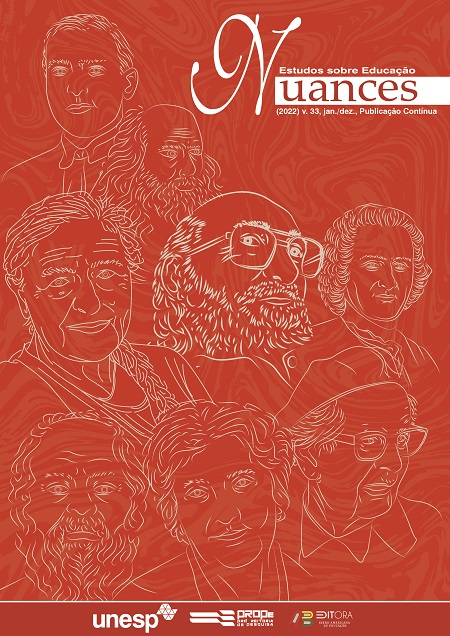A 3-year action research in a vietnamese university
Students as co-generators of class content
DOI:
https://doi.org/10.32930/nuances.v33i00.9494Keywords:
BYOD, Learner-generated content, Active learning, Student presentation, ReviewAbstract
In the context of the 4th Industrial Revolution with unlimited technological advancement and innovation, how can educators innovate their teaching and facilitate their students in their learning process, so that students can accumulate required skills and achieve the set learning outcomes of each course they take? In order to find out the answer, the authors have revised some literature concerning BYOD trend, active learning strategies, flipped classroom and learner-generated content as the theoretical base for their study. Action research has been conducted at a Vietnamese university with the participation of English-majored students in Theory of English Translation and Interpreting classes from 3 different intakes. The findings include students’ positive perception towards the content-generation practices. Some achievements and challenges in the teaching and learning process have also been reported. This paper also recommends further studies so that the practice could be utilized to the best outcomes.
Downloads
References
AL-OKAILY, R. "Mobile learning and BYOD: implementations in an intensive English Program. Learning and Teaching in Higher Education: Gulf Perspectives, v. 10, n. 2, p. 52-68, 2013. Disponível em: https://www.emerald.com/insight/content/doi/10.18538/lthe.v10.n2.141/full/html. Acesso em: 16 jul. 2021.
BAKLA A. Learner-generated materials in a flipped pronunciation class: A sequential explanatory mixed-methods study. Computers & Education. v. 125, p. 14-38, 2018. Disponível em: https://www.sciencedirect.com/science/article/abs/pii/S0360131518301313. Acesso em: 20 jul. 2021.
BALEGHIZADEH, S.; ZARGHAMI, Z. Student -generated test and their impact on ELF student’s learning of grammar. Journal of Theory & Practice in Education, v. 10, n. 3, p. 627-642, 2014.
BURNS, A. Action research: An evolving paradigm? Language Teaching, v. 38, n. 2. p. 57–74, 2005. Disponível em: https://www.cambridge.org/core/journals/language-teaching/article/abs/action-research-an-evolving-paradigm/3220D505260711B19E5FDED22365DBD8. Acesso em: 06 jun. 2021.
BURNS, A. Doing Action Research in English Language Teching: A guide for practioners. Abingdon: Routledge, 2010.
ENFIELD, J. Looking at the Impact of the Flipped Classroom Model of Instruction on Undergraduate Multimedia Students at CSUN. Techtrends, v. 57, n. 6, p. 14-27, 2013. Disponível em: https://link.springer.com/article/10.1007/s11528-013-0698-1. Acesso em: 23 set. 2021.
FREEMAN S. et al. Active learning increases student performance in science, engineering, and mathematics. Proceedings of the National Academy of Sciences, v. 111, n. 23, p. 8410-8415, 2014. Disponível em: https://www.pnas.org/doi/abs/10.1073/pnas.1319030111. Acesso em: 18 may 2021.
HUNG, H. Flipping the classroom for English language learners to foster active learning. Computer Assisted Language Learning, v. 28, n. 1, p. 81-96, 2015. Disponível em: https://www.tandfonline.com/doi/abs/10.1080/09588221.2014.967701. Acesso em: 07 set. 2021.
LAMBERT, C.; PHILP, J.; NAKAMURA, S. Learner-generated content and engagement in second language task performance. Language Teaching Research, v 21, n. 6, p. 665-680, 2016. Disponível em: https://journals.sagepub.com/doi/abs/10.1177/1362168816683559. Acesso em: 25 out. 2021.
LAMBERT, C.; ZHANG, G. Engagement in the Use of English and Chinese as Foreign Languages: The Role of Learner‐Generated Content in Instructional Task Design. The Modern Language Journal, v. 103, n. 2, p. 391-411, 2019. Disponível em: https://onlinelibrary.wiley.com/doi/abs/10.1111/modl.12560. Acesso em: 09 set. 2021.
LEVINE, G. S. Global simulation: A student-centered, task-based format for intermediate foreign language courses. Foreign Language Annals, v. 37, n. 1, p. 26-36, 2004. Disponível em: https://onlinelibrary.wiley.com/doi/abs/10.1111/j.1944-9720.2004.tb02170.x. Acesso em: 23 maio 2021.
KIM, M. et al. The experience of three flipped classrooms in an urban university: An exploration of design principles. The Internet and Higher Education, v. 22, p. 37-50, 2014. Disponível em: https://www.sciencedirect.com/science/article/abs/pii/S1096751614000219. Acesso em: 19 ago. 2021.
KONG, S. Developing information literacy and critical thinking skills through domain knowledge learning in digital classrooms: An experience of practicing flipped classroom strategy. Computers & Education, v. 78, p. 160-173, 2014. Disponível em: https://www.sciencedirect.com/science/article/abs/pii/S0360131514001316. Acesso em: 21 out. 2021.
MCLAUGHLIN, J.; RHONEY, D. Comparison of an interactive e-learning preparatory tool and a conventional downloadable handout used within a flipped neurologic pharmacotherapy lecture. Currents in Pharmacy Teaching And Learning, v. 7, n. 1, p. 12-19, 2015. Disponível em: https://www.sciencedirect.com/science/article/abs/pii/S1877129714001464. Acesso em: 13 nov. 2021.
MEANS, B. et al. Evaluation of Evidence-based Practices in Online learning: A Meta-Analysis and Review of Online Learning Studies. Project Report. Centre for Learning Technology, 2010. Disponível em: https://repository.alt.ac.uk/629/. Acesso em: 16 out. 2021.
MEYER, K. A. Students' Perceptions of Life Skill Development in Project-Based Learning Schools. Mankato: Minnesota State University, 2015.
NUNAN, D. Innovation in language teaching and learning. Hanoi: Hanoi University, 2017.
PRINCE, M. Does active learning work? A review of the research. Journal of engineering education, v. 93, n. 3, p. 223-231, 2004. Disponível em: https://onlinelibrary.wiley.com/doi/abs/10.1002/j.2168-9830.2004.tb00809.x. Acesso em: 25 jun 2021.
RUSSEL, D. Mobile phones in the classroom – what does the research say? Teacher, Apr. 2018. Disponível em: https://www.teachermagazine.com.au/articles/mobile-phones-in-the-classroom-what-does-the-research-say. Acesso em: 15 out. 2021.
SAMS, A.; BERGMANN, J. Flip your students’ learning. Educational Leadership, v. 70, n. 6, p. 16-20, 2013. Disponível em: https://www.ascd.org/el/articles/flip-your-students-learning. Acesso em: 05 ago. 2021.
SANG, V. N.; NGUYEN, J. Student Perception of Using Project-Based Learning (PjBL): A Case Study in UniversitiTeknologi Malaysia (UTM). Singapore: Springer, 2015.
SEE, S.; CONRY, J. Flip My Class! A faculty development demonstration of a flipped-classroom. Currents In Pharmacy Teaching And Learning, v. 6, n. 4, p. 585-588, 2014. Disponível em: https://www.sciencedirect.com/science/article/abs/pii/S1877129714000355. Acesso em: 09 jul 2021.
STOLLER, F. Establishing a Theoretical Foundation for Project-Based Learning in Second and Foreign Language Contexts. In: BECKETT, G. H.; MILLER, P. C. (ed.). Project-Based Second and Foreign Language Education: Past, Present, and Future. Greenwich, CT: Information Age, 2006.
WHITING, K. These are the top 10 job skills of tomorrow - and how long it takes to learn them. Weforum.org, Oct. 2020. Disponível em: https://www.weforum.org/agenda/2020/10/top-10-work-skills-of-tomorrow-how-long-it-takes-to-learn-them/. Acesso em: 10 nov. 2020.
Published
How to Cite
Issue
Section
License
Copyright (c) 2022 Nuances: estudos sobre Educação

This work is licensed under a Creative Commons Attribution-NonCommercial 4.0 International License.
Atribuição-NãoComercial
CC BY-NC
Esta licença permite que outros remixem, adaptem e criem a partir do seu trabalho para fins não comerciais, e embora os novos trabalhos tenham de lhe atribuir o devido crédito e não possam ser usados para fins comerciais, os usuários não têm de licenciar esses trabalhos derivados sob os mesmos termos.





